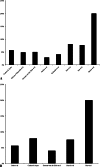Staphylococcus aureus screening and decolonization in orthopaedic surgery and reduction of surgical site infections
- PMID: 23463284
- PMCID: PMC3676622
- DOI: 10.1007/s11999-013-2875-0
Staphylococcus aureus screening and decolonization in orthopaedic surgery and reduction of surgical site infections
Abstract
Background: Staphylococcus aureus is the most common organism responsible for orthopaedic surgical site infections (SSIs). Patients who are carriers for methicillin-sensitive S. aureus or methicillin-resistant S. aureus (MRSA) have a higher likelihood of having invasive S. aureus infections. Although some have advocated screening for S. aureus and decolonizing it is unclear whether these efforts reduce SSIs.
Questions/purposes: The purposes of this study were to determine (1) whether S. aureus screening and decolonization reduce SSIs in orthopaedic patients and (2) if implementing this protocol is cost-effective.
Methods: Studies for this systematic review were identified by searching PubMed, which includes MEDLINE (1946-present), EMBASE.com (1974-present), and the Cochrane Library's (John Wiley & Sons) Cochrane Database of Systematic Reviews (CDSR), Cochrane Central Register of Controlled Trials (CENTRAL), Database of Abstracts of Reviews of Effects (DARE), Health Technology Assessment Database (HTAD), and the NHS Economic Evaluation Database (NHSEED). Comprehensive literature searches were developed using EMTREE, MeSH, and keywords for each of the search concepts of decolonization, MRSA, and orthopedics/orthopedic surgery. Studies published before 1968 were excluded. We analyzed 19 studies examining the ability of the decolonization protocol to reduce SSIs and 10 studies detailing the cost-effectiveness of S. aureus screening and decolonization.
Results: All 19 studies showed a reduction in SSIs or wound complications by instituting a S. aureus screening and decolonization protocol in elective orthopaedic (total joints, spine, and sports) and trauma patients. The S. aureus screening and decolonization protocol also saved costs in orthopaedic patients when comparing the costs of screening and decolonization with the reduction of SSIs.
Conclusions: Preoperative screening and decolonization of S. aureus in orthopaedic patients is a cost-effective means to reduce SSIs.
Level of evidence: Level IV, systematic review of Level I-IV studies. See the Guidelines for Authors for a complete description of levels of evidence.
Figures



Comment in
-
Reply to the Letter to the editor: Staphylococcus aureus screening and decolonization in orthopaedic surgery and reduction of surgical site infections.Clin Orthop Relat Res. 2013 Nov;471(11):3712-3. doi: 10.1007/s11999-013-3255-5. Epub 2013 Aug 28. Clin Orthop Relat Res. 2013. PMID: 23982407 Free PMC article. No abstract available.
-
Letter to the editor: Staphylococcus aureus screening and decolonization in orthopaedic surgery and reduction of surgical site infections.Clin Orthop Relat Res. 2013 Nov;471(11):3709-11. doi: 10.1007/s11999-013-3254-6. Epub 2013 Sep 7. Clin Orthop Relat Res. 2013. PMID: 24014267 Free PMC article. No abstract available.
References
-
- Berthelot P, Grattard F, Cazorla C, Passot JP, Fayard JP, Meley R, Bejuy J, Farizon F, Pozzetto B, Lucht F. Is nasal carriage of Staphylococcus aureus the main acquisition pathway for surgical-site infection in orthopaedic surgery? Eur J Clin Microbiol Infect Dis. 2010;29:373–382. doi: 10.1007/s10096-009-0867-5. - DOI - PubMed
-
- Bode LG, Kluytmans JA, Wertheim HF, Bogaers D, Vandenbroucke-Grauls CM, Roosendaal R, Troelstra A, Box AT, Voss A, van der Tweel I, van Belkum A, Verbrugh HA, Vos MC. Preventing surgical-site infections in nasal carriers of Staphylococcus aureus. N Engl J Med. 2010;362:9–17. doi: 10.1056/NEJMoa0808939. - DOI - PubMed
Publication types
MeSH terms
Substances
LinkOut - more resources
Full Text Sources
Other Literature Sources
Medical
Research Materials

